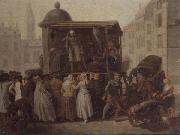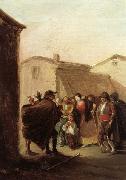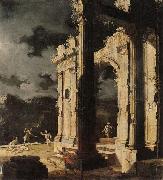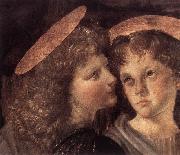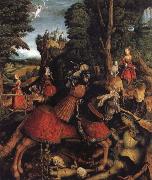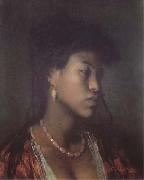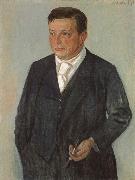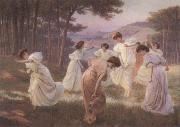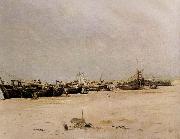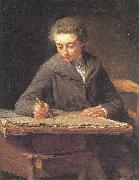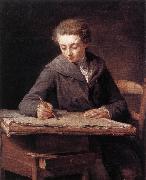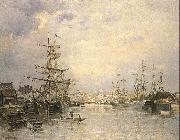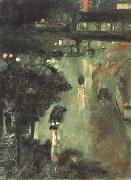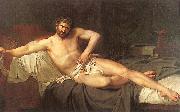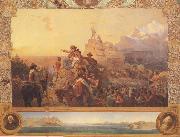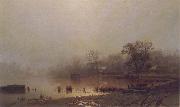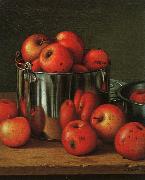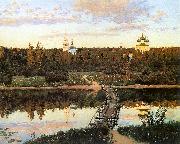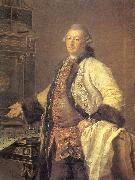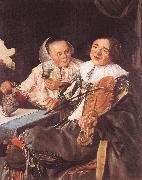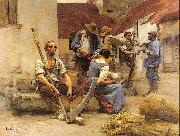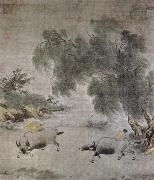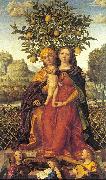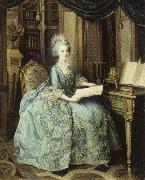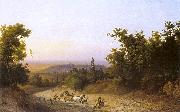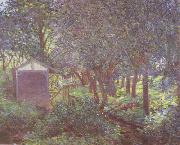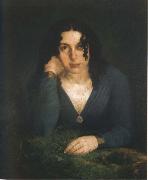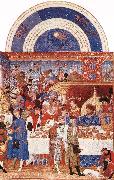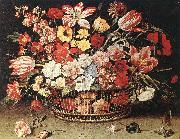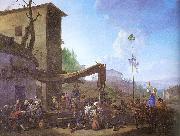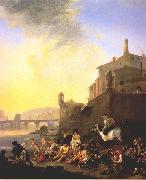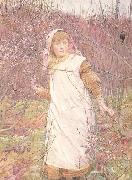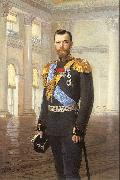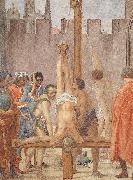|
|
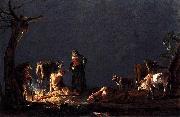 |
Leonaert Bramer
|
|
(24 December 1596 - 10 February 1674 (buried)) was a Dutch painter, best known for probably being one of the teachers of Johannes Vermeer, although there is no similarity between their work. Bramer's dark and exotic style is unlike Vermeer's style. Bramer was primarily a genre and history painter, but also made some unique frescos, not very often found north of the Alps. Leonaert Bramer is one of the most intriguing personalities in seventeenth-century Dutch art. He was a talented and diligent draughtsman, evidently Roman Catholic and a lifelong bachelor.
Bramer was born in Delft. In 1614, at the age of 18, he left on a long trip eventually reaching Rome in 1616, via Atrecht, Amiens, Paris, Aix (February 1616), Marseille, Genoa, and Livorno. In Rome he was one of the founders of the Bentvueghels group of Northern artists. He lived with Wouter Crabeth and got into a fight with Claude Lorraine. He dedicated a poem to Wybrand de Geest. Bramer remained on and off in Rome until October 1627, visiting Mantua and Venice, often for deliveries and to meet Domenico Fetti. In Italy Bramer was nicknamed Leonardo della Notte ("Leonardo of the night"). In 1648 he went to Rome for a second time.
By 1628 he was back in Delft, where he joined the Guild of Saint Luke in 1629 and the schutterij. Among his many patrons were members of the House of Orange, but local burgomasters and schepen also bought his paintings in great numbers.[3] He was a many sided artist, designing for tapestry firms in Delft, painting murals and ceilings, some of which are illusionistic in style. He painted real frescos in the Civic Guard house, the nearby stadholder's palaces in Honselersdijk, Rijswijk, the Communal Land Housde and the Prinsenhof in Delft.[3] Due to the Dutch climate they no longer survive.
He evidently knew the greatest of his Delft contemporaries, Johannes Vermeer, as he came to the latter's defence when his future mother-in-law was trying to prevent him from marrying her daughter.
|
|
|
|
|
|
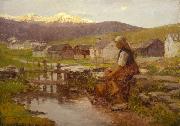 |
Leonardo Bazzaro
|
|
(Milan, 1853-1937) was an Italian painter.
After picking up the basics in the studio of the painter Gaetano Fasanotti, Bazzaro enrolled at the Brera Academy in Milan, where he was awarded the Fumagalli Prize in 1875. The following years saw a series of perspective views set in Milanese churches and mansions. The success achieved with the public and critics alike at a number of major national and international events prompted him to take an interest also in portraiture and landscape painting, for which his favourite settings were Venice and Chioggia. The works of the 1880s and 1890s also include increasingly intimist scenes of everyday life in the setting of Valsassina, Valle deAosta and Verbano. Bazzaro continued to take part in numerous exhibitions in the region of Lombardy as well as the Venice Biennale and the Rome Quadrenniale right up to his death, always achieving great success with collectors and being asked to execute replicas of his most popular subjects.
|
|
|
|
|
|
|
|
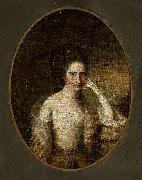 |
Leonor de Almeida Portugal
|
|
Leonor de Almeida Portugal de Lorena e Lencastre (Lisboa, 31 de outubro de 1750 - Benfica, 11 de outubro de 1839) foi uma nobre e poetisa portuguesa. |
|
|
|
|
|
|
|
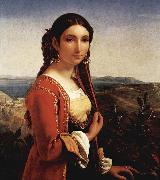 |
Leopold Robert
|
|
(13 May 1794 - 20 March 1835), Swiss painter, was born at La Chaux-de-Fonds (Neuchâtel) in Switzerland, but left his native place with the engraver Girardet at the age of sixteen for Paris.
He was on the eve of obtaining the grand prix for engraving when the events of 1815 blasted his hopes, for Neuchâtel was restored to Prussia, and Robert was struck off the list of competitors as a foreigner. Whilst continuing his studies under Girardet he had never ceased to frequent the studio of David, and he now determined to become a painter, and only returned to his native country when his master himself was exiled. At Neuchâtel he attracted the notice of Roullet de Mezerac, who enabled him by a timely loan to proceed to Rome. In depicting the customs and life of the people, of southern Italy especially, he showed peculiar feeling for the historical characteristics of their race.
After executing many detached studies of Italian life Robert conceived the idea of painting four great works which should represent at one and the same time the four seasons in Italy and the four leading races of its people. In the "Return from the Fete of the Madonna dell'Arco" (Louvre) he depicted the Neapolitans and the spring. This picture, exhibited at the Salon of 1827, achieved undoubted success and was bought for the Luxembourg by Charles X; but the work which appeared in 1831 the "Summer Reapers arriving in the Pontine Marshes" (Louvre), which became the property of Louis Philippe established the artist's reputation.
Florence and her autumn vineyards should now have furnished him with his third subject. He attempted to begin it, but, unable to conquer his passion for Princess Charlotte Napoleon (then mourning the violent death of her husband, Robert's devoted friend), he threw up his work and went to Venice, where he began and carried through the fourth of the series, the "Fishers of the Adriatic." This work was not equal to the "Reapers." Worn by the vicissitudes of painful feeling, and bitterly discouraged, Robert committed suicide before his easel on 20 March 1835, on the tenth anniversary of the melancholy suicide of a brother to whom he had been much attached.
|
|
|
|
|
|
|
|
|
|
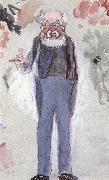 |
Leslie Ward
|
|
British Illustrator caricaturist and portrait painter , (1851-1922),
|
|
|
|
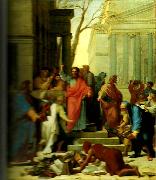 |
lesueur
|
|
Charles Alexandre Lesueur (Le Havre, January 1, 1778 - Le Havre, December 12, 1846) was a French naturalist, artist and explorer.
Pictured here is the oil portrait by Charles Willson Peale of Charles-Alexandre Lesueur. The original hangs in the reading room of the of Ewell Sale Stewart Library in the Academy of Natural Sciences of Philadelphia.
In 1801 he traveled to Australia as artist on the expedition of Nicolas Baudin. With François Peron he took over the duties as naturalist after the death of the expedition's zoologist Rene Mauge. Together they collected over 100,000 zoological specimens.
Between 1815 and 1837 he lived in the United States In 1833, he visited Vincennes, Indiana where he sketched the first known drawing of Grouseland, the mansion of William Henry Harrison. The mansion is today a National Historic Landmark.
In the years 1825-1837 Lesueur lived in New Harmony, Indiana, where he filled sketchbooks full of the finds discovered during the utopian adventure funded by his friend William Maclure. He drew the boat "Philanthropist", which arrived full of intellectuals who came to live in the small town of New Harmony, on the Wabash River. He took research trips and sketched the people and the small towns in the area. He was in New Harmony when Prince Maximilian, Prince of Wied-Neuweid, Germany, and artist Karl Bodmer came to spend five months there in 1832-1833. Prince Maximilian said of Bodmer "He had explored the country in many directions, was acquainted with everything remarkable, collected and prepared all interesting objects and had already sent considerable collections to France" (Elliott Johansen, p. 6) Indeed, LeSeur sent specimens of unique fish, animals and fossils, as well as artifacts he had dug from the Indian Mounds in New Harmony back to France, where they remain.
LeSeur returned to France in 1837, only after his friends Thomas Say and Joseph Barabino had died and William MacClure had returned to Philadelphia, accompanied by many of his fine books. He had spent 21 years in the United States, but continued his scholarly studies and activities in France, where he resumed his occupation of artist-naturalist and began to catalogue his extensive research and artwork. At last, he was awarded the honor of Chevalier de l??Ordre Royal de la L??gion d'honneur for his long years of work in the sciences |
|
|
|
|
|
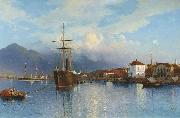 |
Lev Feliksovich Lagorio
|
|
(Russian: 1828-1905) was a Russian painter, known for his paintings of seascapes.
Lagorio was born in Feodosia, Crimea (now Ukraine) and later studied in the Imperial Academy of Arts in Saint Petersburg. His teachers were Maxim Vorobiev and B. P. Villeval'de. While he lived in Feodosia, he was influenced by the painter Ivan Aivazovsky. In 1845 Lagorio went on a sea voyage on the warship Groziashchy to study the arrangement of the ship.
Lagorio spent eight years in Italy. The paintings he created there brought him to the status of professor on his return home to Russia.
In his later years, he painted the coastal views of Finland and Norway. He also painted motives of the Russian-Turkish war.
|
|
|
|
|
|
|
|
|
|
|
|
|
|
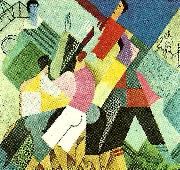 |
lhote
|
|
Andre Lhote (5 July 1885 -- 25 January 1962) was a French sculptor and painter of figure subjects, portraits, landscapes and still life. He was also very active and influential as a teacher and writer on art.
Lhote was born in Bordeaux and learnt wood carving and sculpture from the age of 12, when his father apprenticed him to a local furniture maker to be trained as a sculptor in wood. He enrolled at the École des Beaux-Arts in Bordeaux in 1898 and studied decorative sculpture until 1904. Whilst there, he began to paint in his spare time and he left home in 1905, moving into his own studio to devote himself to painting. He was influenced by Gauguin and C??zanne and held his first one-man exhibition at the Galerie Druet in 1910, four years after he had moved to Paris.
After initially working in a Fauvist style, Lhote shifted towards Cubism and joined the Section d'Or group in 1912, exhibiting at the Salon de la Section d'Or. He was alongside some of the fathers of modern art, including Gleizes, Villon, Duchamp, Metzinger, Picabia and La Fresnaye.
The outbreak of the First World War interrupted his work and, after discharge from the army in 1917, he became one of the group of Cubists supported by Leonce Rosenberg. In 1918, he co-founded Nouvelle Revue Française, the art journal to which he contributed articles on art theory until 1940. Lhote taught at the Academie Notre-Dame des Champs from 1918 to 1920 and later taught at other Paris art schools including his own school, which he founded in Montparnasse in 1922.
Lhote lectured extensively in France and abroad, including Belgium, England, Italy and, from the 1950s, also in Egypt and Brazil. His work was awarded with the Grand Prix National de Peinture in 1955, and the UNESCO commission for sculpture appointed Lhote president of the International Association of Painters, Engravers and Sculptors. Lhote died in Paris in 1962. |
|
|
|
|
|
|
|
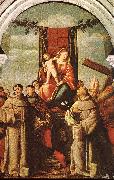 |
LICINIO, Bernardino
|
|
Italian painter, Venetian school (b. ca. 1489, Poscante, d. ca. 1565, Venezia) |
|
|
|
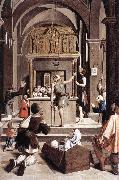 |
LIEFERINXE, Josse
|
|
French painter, Provençal school (active 1493-1508 in Marseille) |
|
 |
Lieve Verschuier
|
|
(1627-1686) was a Dutch Golden Age painter of maritime subjects.
He was born in Rotterdam, and is documented in Amsterdam in 1651, where he possibly learned to paint from Simon de Vlieger. He traveled to Rome in 1653 as a young man with Jan Vermeer van Utrecht and became friends with Willem Drost and Johann Carl Loth.. On his return he settled in Rotterdam in 1667 where he remained, painting marine scenes, and Italianate landscapes.
His maritime works are valued today for their historical value illustrating the art of shipbuilding in the 17th century.
|
|
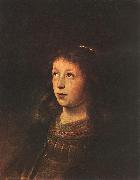 |
LIEVENS, Jan
|
|
Dutch painter (b. 1607, Leiden, d. 1674, Amsterdam) |
|
|
|
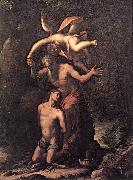 |
LIGOZZI, Jacopo
|
|
Italian painter, Florentine school (b. 1547, Verona, d. 1627, Firenze) |
|
|
|
|
|
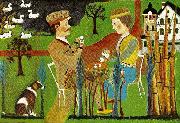 |
lim-johan
|
|
Johan Erik Olsson, född 1865, död 1944, svensk konstnär, autodidakt och naivist, bosatt i Kyan, Hälsingland, där han försörjde sig som dagsverkare, laggkärlstillverkare och fotograf. Hans släkt kom från Lima i Dalarna, därav namnet. Som ung vistades han 8 år på Ulleråkers mentalsjukhus i Uppsala. Fram till 1920-talet målade han natur, djur och andra motiv från hemtrakterna i fantasifull, närmast exotisk gestalt. Lim-Johan uppmärksammades inte under sin levnad, men finns i dag representerad på bland annat på Edsbyns museum i Hälsingland och på Moderna Museet i Stockholm. 1944 avled Lim-Johan på Ovanåkers ålderdomshem efter en tids sjukdom. Han är begravd på Ovanåkers kyrkogård, där det sedan 1994 står "LIM-JOHAN" på gravstenen.
Hans konst upptäcktes av en tillfällighet av fil.dr. Philibert Humbla, länsintendent på Gävle museum, som bad Hans Lidman att försöka finna så många tavlor av Lim-Johan som möjligt. Lim-Johan räknas i dag bland de förnämsta naivisterna i världen. |
|
|
|
|
|
|
|
|
|
|
|
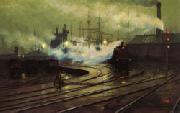 |
Lionel Walden
|
|
(1861-1933) was born in Norwich, Connecticut in 1861. He first became interested in art in Minnesota, where the family moved when his father became rector of an Episcopal Church there. As a young man, Walden moved to Paris where he studied painting with Carolus-Duran. In around 1893-97, Walden was in England, living in Falmouth. Paintings of Cardiff in Wales are in museums in Cardiff and Paris. Walden received medals from the Paris Salon and was made a Knight of the French Legion of Honor. He visited to Hawaii in 1911 and several times thereafter. Walden died in Chantilly, France in 1933.
According to David H. Forbes, author of Encounters with Paradise: Views of Hawaii and its People, 1778-1941, Lionel Walden "was the finest seascape painter to work in Hawaii". The Brooklyn Museum, the Henry Art Gallery (University of Washington, Seattle), the Honolulu Academy of Arts, the Isaacs Art Center (Waimea, Hawaii), and the Musee d'Orsay are among the public collections holding works by Lionel Walden.
|
|
|
|
|
|
|








